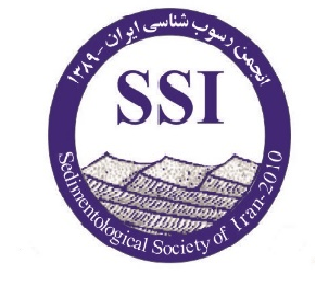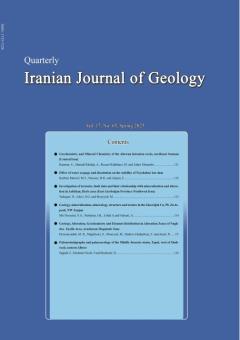Investigation of tectonics, fault data and their relationship with mineralization and alteration in Asbkhan, Heris area (East Azerbaijan Province - Northwest Iran)
Subject Areas :
N. Yadegari
1
*
,
Seyed Ghafor Alavi
2
,
Mohsen Moayyed
3
![]()
1 -
2 -
3 -
Keywords: Asbkhan, Joint, Tectonic, Fault ,
Abstract :
The study area is located in the south of Qushadagh mountain range, in the north of Asbkhan village, Heris township and in East Azarbaijan province. In terms of structural geology of Iran, this area is located in the main zone of Central Iran and Alborz-Azerbaijan sub-zone. The geological units of the region are including Eocene igneous and pyroclastic rocks with combination of andesitic, Trachyandesitic, basaltic, tuffic and ignembritic. The semi-deep intrusive mass with Oligocene age, with the combination of quartz diorite, diorite and quartz monzonite in the form of stock and dyke is exposed in the area. Structural studies, including fault plates, slickenside on them, and the joints system in various lithologies, indicate at least two general stress directions in the range, Which can be created following one tectonic regime or two tectonic regimes. If we consider the tectonic regime as a phase and consider the tensors with different directions as the result of rotation in the fault plates, We can introduce a general strike-slip regime with a general north-south trend that controls the existing structures of the region. At the same time, the infiltration of intrusive masses has caused the disintegration of these structures and made the issue more complicated. In general, faults with a northwest-southeast trend and a right on strike-slip mechanism, form the main structures of the area.Other faults are controlled by the main structures following the Riddle fractures system. Based on the system of joints in four different lithologies, lithological units from old to new include: basaltic andesite, quartz diorite, quartz monzonite (porphyry mass) and diorite, which from old to new reduces the diversity of the joints system. The northwest-southeast tectonic system has been involved in the development of argillic alteration and the northeast-southwest system has been important in the development of siliceous and mineralized veins.
آقانباتی، ع.، 1383. زمینشناسی ایران. سازمان زمینشناسی و اکتشافات معدنی کشور،586.
درویشزاده، ع.، 1372. زمینشناسی ایران. انتشارات نشر دانش امروز، 440.
قربانی، م.، 1381، دیباچهای بر زمینشناسی اقتصادی ایران، انتشارات سازمان زمینشناسی و اکتشافات معدنی کشور، 695 .
موید، م.، 1380. ژئوشیمی و پترولوژی تودههای آتشفشانی - پلتونیکی در منطقه طارم. پایاننامه دکتری. 256.
نبوی، م.، 1355. دیباچهای بر زمینشناسی ایران. انتشارات سازمان زمینشناسی کشور، 109.
Allen, M., Jackson, J. and Walker, R., 2004. Late Cenezoic reorganization of the Arabia-Eurasia collision and the comparision of short-term and long-term deformation rates. Tectonics.23, TC2008.
Ambraseys, N.N., 1997. The Krasnovodsk (Turkmenistan) earthquake of 8 July 1895, J. Earthquake Engineering., 1, 293–317.
Angelier, L., 1994. Faults slip analysis and paleostress reconstruction. In: Hancock, P.L. (Ed.), Continental Deformation. Pergamon, Oxford. 110-120.
Axen, G.J., Lam, P.S., Grove, M. and Stockli, D.F., 2001. Exhumation of the west-central Alborz mountains, Iran, Caspian subsidence, and collision-related tectonics. Geology, 29, 559–562.
Azizi, H. and Jahangiri, A., 2008. Cretaceous subduction-related volcanism in the northern Sanandaj-Sirjan Zone, Iran. journal of geodynamics. 45, 178–190.
Azizi, H., and Moinevaziri, H., 2009. Review of the tectonic setting of Cretaceous to Quaternary volcanism in northwestern Iran. journal of geodynamics. 47 (2009) 167–179.
Baker, C., 1993. The active seismicity and tectonics of Iran. PhD thesis, University of Cambridge, UK.
Blourian, G.H., 1994. Petrology of Tertiary volcanic rocks in the north of Tehran. M.SC. Thesis. University of Tarbiate Moalem, Tehran, Iran, 145.
Calagari, A.A., 2004. Fluid inclusion studies in quartz veinlets in the porphyry copper deposit at Sungun, East-Azarbaidjan, Iran Journal of Asian Earth Sciences. 23, 179–189.
Calagari, A.A. and Hosseinzadeh, G., 2006. The mineralogy of copper-bearing skarn to the east of the Sungun-Chay river, East-Azarbaidjan, Iran. Journal of Asian Earth Sciences. 28, 423–438.
Carey-Gailhardis, E. and Vergely, P., 1992. Graphical analysis of fault kinematics and focal mechanisms of earthquakes in term of stress; the right dihedral method, use and pitfalls. (1), 3-9.
Delvaux, D. and Sperner, B., 2003. Stress tensor inversion from fault kinematic indicators and focal mechanism data: the TENSOR program. In: Nieuwland, D. (Ed.), New Insights into Strucural Interpretation and Modelling,. 212. geological society london special publications. 75-100.
Delvaux, D., Moeys, R., Stapel, G., Petit, C., Levi, K., Miroshnichenko, A., Ruzhich, V. and Sankov, V., 1997. Paleostress reconstructions and geodynamics of the Baikal region, Central Asia. Part II: Cenozoic rifting. In: Cloetingh, S., Fernandez, M., Munoz, J.A., Sassi, W. and Horvath, F. (Eds.), Structural controls on sedimentary Basin Formation: Tectonophysics, 282. 1-38.
Dewey, J.F., Hampton, M.R., Kidd, W.S.F., Saroglu, F. and engor, A.M.C.S., 1986. Shortening of Continental lithosphere: the neotectonics of eastern Anatolia, a young collision zone. . geological society london special publications. 19, 3-36.
Fossen, H., 2010. Structural Geology. Cambridge University Press. Cambridge, 463.
Hempton, M.R., 1987. Constrains on Arabian plate motion and extensional history of the red sea. Tectonics 6, 687-705.
Rebai, S., Philip, H., Dorbath, L., Borissoff, B., Haessler, H., and Cisternas, A., 1993. Active tectonics in compressive and extensional structures. Tectonics 12: 1089-1114.
Shabanian, E., Bellier, O., Abbassi, M.R., Siame, L. and Farbod, Y., 2009. Plio-Quaternary stress states in NE Iran: Kopeh Dagh and Allah Dagh-Binalud mountains, Tectonophysics. 480, 280–304.

